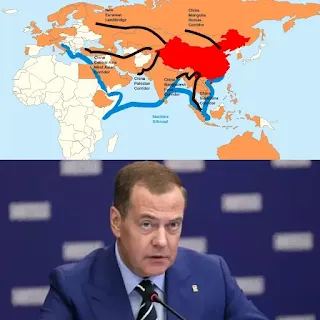Beijing is hosting the third Belt and Road forum for international cooperation from Wednesday. Launched 10 years ago by China, the BRI aims to build infrastructure for the benefit of various countries.
China thus intends to play its part in the modernization of developing countries.
"To achieve the SDG goals, these countries do not have confidence in themselves. So the BRI (Belt and Road Initiative) tells them that they must follow their own path towards modernization. China's encouragement of modernization , especially opening up and reform, (and) the so-called "if you want to get rich, build on the road first". So I think it is very important for the international order to be focused on infrastructure and development, not just the high level and high standards of the rules-based international order.'', explains Wang Yiwei, director of the Institute of International Affairs, Renmin University of China.
While it is presented as a win-win by Beijing, the Silk Road is debated. Due to projects financed through loans, debtor countries would find themselves trapped in debt.
"The reception and positive support is undeniable, I think some factors may have played into this. Firstly, the examples of other countries that have gone into debt and the BRI has been seen as a trap, a sort debt trap.'' explains Pavida Pananond, professor of international business at Thammasat Business School.
The Attarat power plant left Jordan with a multibillion-dollar debt to China, all for a plant whose energy is no longer needed, due to other agreements reached since then. the design of the project.
If the initial agreement is maintained, Jordan will have to pay China the astronomical sum of $8.4 billion over 30 years to buy the electricity produced by the plant.
China also holds the majority of the debt of several African countries linked to infrastructure construction.
Russian Foreign Ministry: Moscow considers the attack on the hospital in Gaza a crime and an inhumane act
In his speech at the "One Belt, One Road" Forum in Beijing, President Vladimir Putin affirmed Russia and China's pursuit of sustainable development and social prosperity, and their adherence to equal cooperation and the right of countries in their approach to development.
Below are the most important things that came from Putin’s speech.
Russia and China's pursuit of sustainable development and social prosperity
Russia and China adhere to equal cooperation and respect for countries' rights in their own approach to development
The continuation of the “North-South” corridor project for railways and automobile roads in the European part of Russia between the Baltic Sea and the south of the country, all the way to Iran.
Implementing a project to connect the North Sea and the Arctic Ocean and railway lines from central Siberia south to the Indian and Pacific Oceans.
A railway is being built connecting the Republic of Yakutia and the Russian Far East, bridges across the Lena and Amur rivers are being built, and highways are being modernised.
Russia invites interested countries to participate in the development of the Northern Sea Route route, which will connect the world.
Several promising railway lines will appear in Russia, along with Eurasian projects that will create a unified transport logistics framework.
China is successfully implementing the "One Belt, One Road" initiative, and Russia is happy about it.
The “One Belt, One Road” initiative will help solve important and pressing regional and international problems.

